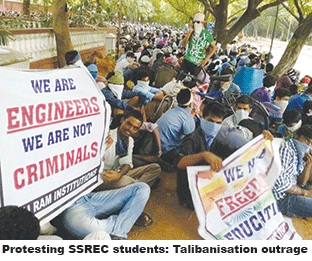Tamil Nadu: Control-command campuses
 Within 21st century India’s under-developed academic establishment, there’s a curious and inexplicable reluctance to treat college and university students as adults. Although most tertiary students have been endowed with the right to vote and elect national and state governments, on campuses across the country, constitutionally illiterate academics with rigid control-and-command mindsets deny adult students the most elementary freedoms taken for granted in democracies around the world.
Within 21st century India’s under-developed academic establishment, there’s a curious and inexplicable reluctance to treat college and university students as adults. Although most tertiary students have been endowed with the right to vote and elect national and state governments, on campuses across the country, constitutionally illiterate academics with rigid control-and-command mindsets deny adult students the most elementary freedoms taken for granted in democracies around the world.
This is particularly true of Tamil Nadu’s 552 engineering and 420 arts and science college administrators who regularly impose elaborate dress and “moral conduct” codes on adult students. In keeping with this tradition, on September 20 the management of the Sri Sai Ram Engineering College (SSREC, estb.1995), Chennai, a reputed private college affiliated with Anna University, issued a dress and deportment circular which has aroused widespread indignation within the students’ community.
The circular proscribes wearing of jeans, leggings, tight pants and tops, patialas, dangling earrings and “fancy slippers” by women students who are also advised on how to drape salwar-kurta-dupatta and do their hair modestly. Moreover the management also banned all students from using cell phones and pen drives; hosting facebook and other accounts on social media; birthday celebrations on campus; using two-wheelers and cars; interaction with the opposite sex or students of other departments, and use of rest-rooms during class hours.
This “talibanisation” of SSREC has outraged the college’s students’ community which organised a massive protest at the parent Anna University on September 30. A specific demand of the students was immediate termination of the services of SSREC’s superintendent and campus-in-charge P. Balu, who reportedly patrols college corridors on “moral policing rounds” and imposes heavy fines for violations of dress codes and interaction between male and women students. When the police detained some protesting students, hundreds of SSREC students petitioned the police commissioner’s office and demanded legal action against Balu and other college officials for assault and sexual harassment. SSREC alumni also joined the protest and generated a storm on social media posting tweets and videos deploring the institute’s authoritarian rules, and recounting their unpleasant experiences with Balu, also a trustee of the college. Embarrassed by the accusation of students, the college management blatantly denied that its “advisory” circular mandates a dress code and other conduct rules.
The SSREC students’ spirited protest and agitation for elementary freedoms has thrown light upon the tendency of college and university managements to over-regulate the lives of students. Quite obviously professorial mind-sets haven’t changed since 2006 when Anna University vice chancellor D. Viswanathan also decreed a detailed code for students in all affiliated engineering colleges and banned cell-phones and film-based cultural events. Again, in 2012, the Central government promoted and globally-renowned Indian Institute of Technology, Madras prescribed a moral code of conduct for students, banning women from venturing out on campus after 11 p.m — a rule reportedly prescribed for their safety. In both cases, student protests were supported by the national media and managements had to withdraw the edicts.
Liberal academics are perplexed that academics in higher education institutions, who should be focusing on weightier issues, spend disproportionate time on trivia such as dress codes and ‘moral conduct’ i.e, sex lives of adult students. “Instead of enforcing unreasonable restrictions on students, college managements should learn to distinguish between adults in higher education and children in schools. They should leave it to students to maintain decorum in educational institutions and dress appropriately,” says D. Jayalakshmi, former professor of sociology at Madras University.
However, despite attempts by enlightened academics and media to change archaic mindsets, the standard argument of college managements is that they are responsible to parents for students’ safety. Academics countrywide see no contradiction between teaching 21st century syllabuses and enforcing Victorian dress and behavioural rules and regulations upon adult students.
Separate stairways and seating arrangements for men and women, ban on interaction between the sexes and regular patrolling in colleges are normative in Tamil Nadu’s college/university campuses.
“Imposing social constraints on students limits their growth and maturity and prevents them from forming healthy social relationships. Later, they find it difficult to become team players in workplaces where women may be their bosses. One expects learned academics to encourage students to shed their inhibitions and enter the workforce as confident youngsters with leadership qualities,” says Sekhar Srinivasan, director, Genie Consultants Pvt. Ltd, a Chennai-based human resources company.
Unfortunately, such progressive thinking is unacceptable to Tamil Nadu’s olde world academics, physically in the 21st century, but with mindsets and social attitudes still mired in the 19th century.
Hemalatha Raghupathi (Chennai)














Add comment